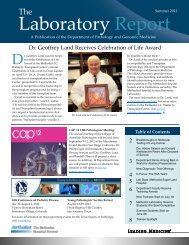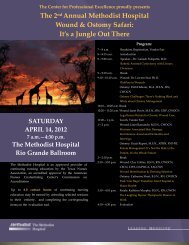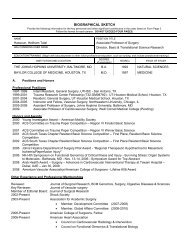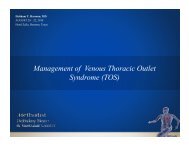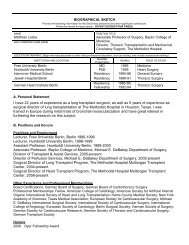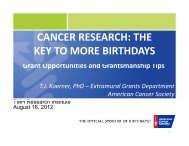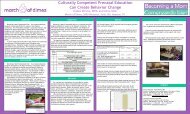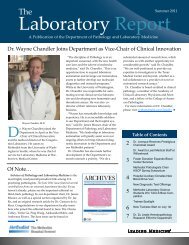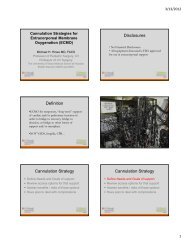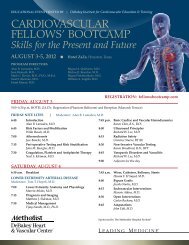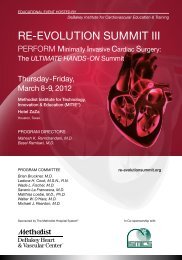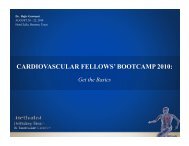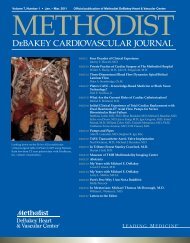The Facts Karla M. Ku - The Methodist Hospital
The Facts Karla M. Ku - The Methodist Hospital
The Facts Karla M. Ku - The Methodist Hospital
Create successful ePaper yourself
Turn your PDF publications into a flip-book with our unique Google optimized e-Paper software.
let te Rs to tHe e dItoR<br />
Send letters to the editor to<br />
William L. Winters, M.D.,<br />
jmdhc@tmh.tmc.edu or mail<br />
a disk or CDROM and a print<br />
out to JMDHC, 8060 El Rio<br />
St., Houston, TX 77054. Letters<br />
discussing a recent JMDHC article<br />
should not exceed 600 words in<br />
length and limited to one figure<br />
or table and five references. <strong>The</strong>y<br />
should be double-spaced and a<br />
word count should be provided.<br />
<strong>The</strong> names, academic degrees, and<br />
primary institutional affiliations of<br />
all authors as well as the address,<br />
telephone and fax numbers, and email<br />
address for the corresponding<br />
author must be included in the text<br />
of the letter in order to be considered<br />
for publication. Letters will be<br />
published at the discretion of the<br />
editor-in-chief and are subject to<br />
editing for style and space requirements.<br />
L E T T E R T O T H E E d I T O R<br />
Consultant Roles<br />
Dear Dr. Winters:<br />
I had occasion recently to read your<br />
essay on “Etiquette Guidelines for<br />
Consultants? Are <strong>The</strong>re Any?”<br />
JMDHC 1(4) 2005. I enjoyed what<br />
you had to say. A colleague at the<br />
University of Miami Miller School of<br />
Medicine sent it to me after I sent him<br />
an expanded version of something he<br />
requested, which I prepared many years<br />
ago for GI fellows in training at UM.<br />
Having retired December 12, 2001, I<br />
had almost forgotten that I had.<br />
<strong>The</strong> teaching of important nontechnical<br />
(in the traditional sense) skills<br />
designed to improve doctor-doctor and<br />
doctor-patient communication, confidence,<br />
and trust should begin early in<br />
training.<br />
I hope you enjoy reading what I have<br />
prepared on the topic of becoming an<br />
effective consultant, whether performing<br />
a cognitive or technical service.<br />
Best wishes,<br />
Arvey I. Rogers, MD, FACP<br />
Professor Emeritus (Retired)<br />
Internal Medicine/Gastroenterology<br />
University of Miami Miller<br />
School of Medicine<br />
IntRoduCtIon<br />
• You will be asked frequently to<br />
provide assistance/expertise (consult)<br />
in the management of patients with<br />
suspected or established disorders of<br />
the digestive system.<br />
• <strong>The</strong> assistance may be of an urgent or<br />
elective nature.<br />
• <strong>The</strong> request for your expertise may<br />
come in written or verbal form.<br />
• You possess expertise which the<br />
consulting physician does not.<br />
• How you provide your expertise<br />
reflects on you specifically and the<br />
service you represent generally.<br />
• While there are many ways to func-<br />
tion at a high level as a consultant, a<br />
proposed set of guidelines follows:<br />
GuIdelInes<br />
1. Respond promptly to the consultation<br />
request.<br />
2. Communicate verbally with the<br />
consulting physician for several<br />
reasons:<br />
a. Establish a personal relationship.<br />
b. Assess the urgency of the consult.<br />
c. Determine the specific reason for<br />
the consult, i.e., To perform a procedure?<br />
To answer a question? To<br />
follow up on a consult provided<br />
previously by a colleague?<br />
d. Assess the level of knowledge of the<br />
consulting physician.<br />
e. Gather additional data to assist you<br />
in planning the consult, i.e., what is<br />
needed, in what setting, with what<br />
preparation, etc.<br />
f. Inform the consulting physician<br />
when you will be seeing the patient.<br />
3. Establish a consultant relationship<br />
with the patient, explaining<br />
your role; that you will be working<br />
closely with the patient’s primary<br />
physician who will be informed of<br />
your findings and recommendations;<br />
and that you will follow up as<br />
necessary.<br />
4. Provide answers and recommendations<br />
(verbally and in writing)<br />
expeditiously and be certain they are<br />
understood by the consulting physician.<br />
5. Teach with humility.<br />
6. Provide appropriate current or<br />
classic references (affix a copy of an<br />
article when appropriate).<br />
7. Be certain that the consulting physician<br />
wishes you to remain involved<br />
in the care of the patient; avoid<br />
assuming control or “taking over”<br />
the case.<br />
8. Write legibly!<br />
9. “Sign off” the case with the knowledge<br />
of the consulting physician.<br />
10. Be certain that your attending or<br />
responsible fellow (more senior to<br />
you) knows about the consult, your<br />
2 II (1) 2006 | JMDHC



